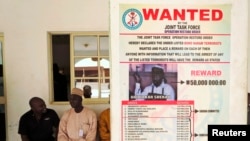Nigerian forces have launched counter-attacks against Boko Haram militants holding a northeastern town where hundreds of civilians may have been slaughtered and thousands forced to flee, an official said Friday.
The fight for the town of Baga is turning into one of the bloodiest in recent months as the Nigerian government struggles to stem the campaign of violence and terror that the Islamist group has waged in northeastern Nigeria.
Nigerian troops were driven from the military base in Baga on January 3 after an intense gunbattle. Officials said that since then, militants have burned down much of Baga and surrounding villages, prompting thousands to flee to islands in Lake Chad or the Borno state capital, Maiduguri.
A Nigerian government spokesman, Mike Omeri, said Friday that security forces have been engaged in intense fighting and have been "actively pursuing militants" since Baga was first attacked Saturday. He said Nigerian air force jets have also hit militant targets.
Estimates of the number of civilians killed in the past week range from several hundred to as many as 2,000. Baga district head Baba Abba Hassan told VOA the bulk of the killing happened Saturday when Baga fell.
Maina Maaji Lawan, a senator who represents the district, told VOA at least 1,000 people in and around the town were killed.
"Not anywhere in the hundreds. Not anywhere in the hundreds. I am very certain about that one,” he said. “Nobody is there to do a count but it is a disastrous situation."
He said residents who escaped told him militants emptied food stores and pharmacies before setting fire to the town again Wednesday. He said at least eight other nearby villages and towns may have been raided this week.
Survivors of the killings said militants pursued and killed residents fleeing into the bush. Other residents took canoes across Lake Chad or tried to swim. Other survivors told VOA that government soldiers ran out of ammunition in the fight and had to flee.
"All of these places they have overran now completely,” Lawan said. “Completely... dead bodies are littering the streets and the forests in all these villages I am talking about.”
In a phone interview from a refugee camp in Gouboua, Chad, Abubakar Umar said he and many others had woken up Saturday to the sound of gunfire coming from a Baga suburb. As scores of people ran to the lake to escape the gunfire, he and several others rowed onto the water in a fisherman’s boat and spent more than 24 hours on the water.
He said one woman who had also escaped to the refugee camp told him that the militants have gathered all the women and children ostensibly to teach them how to read, but instead they started "marrying" the girls.
“By small girls I mean girls like 12, 13 or 14 years old. They don't bother with the old women, but any girl or woman they like, they will call on their colleagues and say marry this one to me,” he said.
Some 7,000 civilians have been forced to flee to Chad over the past 10 days, according to the U.N. refugee agency.
Boko Haram grew out a small-scale movement of Islamic teachers and students in northern Nigeria in the 1990s. By 2002, the group coalesced under the leadership of a charismatic preacher named Mohamad Yusuf. His killing in 2009, and a violent police crackdown, prompted the group to underground and led to a campaign of terror that has spread throughout three northeastern states.
The violence this week came as campaigning for presidential and parliamentary elections got underway.
President Goodluck Jonathan, who is running for re-election in the February vote, has come under strong criticism for failing to stop the Boko Haram onslaught.
VOA’s Ibrahim Ahmed in Washington and Kareem Haruna in Maiduguri, Nigeria contributed to this report.




